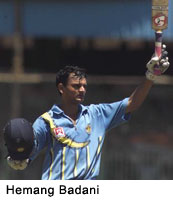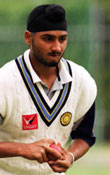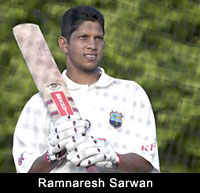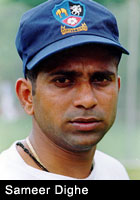Windies smash India in ODI final
Prem Panicker
For those collecting instances of teams going through the league phase of ODI tournaments like a hot knife through the proverbial butter and then coming a cropper in the finals, here's another.
India not only went through its four league encounters undefeated, but did so with an ease that installed them as firm favourites going into Saturday's final. So, of course, the last game of the Zimbabwe tour upset the form book.
And India ended its tour with a sobering thought. Having won the first Test, it threw away a golden chance to win the second and, with it, its first overseas series win in 15 years, thanks to an hour of carelessness in the second Test. Similarly, in the ODIs, it cruised till the final stage, then stumbled.
A lesson in there, perhaps, for the coach, captain, and team?
 Teamwise, an early-morning injury to Hemang Badani ended up being a bit of a boon for the Indians, since it meant that Reetinder Singh Sodhi remained in the lineup. As it turned out, the youngster got his first real chance to parade his stuff, and turned in an all-round performance of such skill that we got the beginnings of the answer to a plaguey question: who will replace Robin Singh as the bits-and-pieces all-rounder in the side?
Teamwise, an early-morning injury to Hemang Badani ended up being a bit of a boon for the Indians, since it meant that Reetinder Singh Sodhi remained in the lineup. As it turned out, the youngster got his first real chance to parade his stuff, and turned in an all-round performance of such skill that we got the beginnings of the answer to a plaguey question: who will replace Robin Singh as the bits-and-pieces all-rounder in the side?
V V S Laxman returned from a finger injury to bolster the batting, and the team went in with a three-seam, two-spin attack that seemed justified given the conditions.
The track was the same -- albeit watered and rolled -- on which India and the West Indies played the final league encounter on Wednesday. Which meant even bounce, and some turn for the spinners. Further, the morning dawned very cold, cloudy, with a bit of breeze -- a combination offering some swing and seam for the team bowling first.
Sourav Ganguly, thus, won the toss and opted for a bowl. "If it was sunny, we would have batted first," the captain said after the toss.
The events of the first 10 overs made you wonder if perhaps the promise held out by the clouds and breeze actually did more harm than good. For once, the normally steady Debasish Mohanty, Ashish Nehra and Zaheer Khan tried that touch too hard to break through.
It could just as easily be that the Windies had spent some time in introspection. As skipper Carl Hooper said on the eve of the game, though the Windies openers had thus far got the team off to good starts, it was at relatively slow scoring rates.
It is in this context interesting that Daren Ganga with 228 and Chris Gayle with 195 were, at the end of the Windies innings, the second and third highest scorers in the tournament, behind India's Sachin Tendulkar (the 'off-form' Ganguly, interestingly, walked out to begin India's chase with 185 against his name in fourth place). For a long time now, the Windies have struggled to find an opening pair of some solidity -- is this, finally, it?
This time round, Gayle and Ganga came out on speed. Both were beaten initially -- Gayle very badly by Nehra -- but neither allowed it to get to them. Time and again, the two openers planted their front foot well forward, set themselves, and hit flamboyantly on the rise, taking on the swing and seam and negating it by the power they packed into their swings.
Scores of 33/0 in 5 and 69/0 in 10 meant that for the first time in this series, the Indians in the field began feeling early pressure. In fact, Harbhajan Singh had to be brought into the attack as early as the tenth over following the emphatic dismissal of the three seamers by the Windies openers.
 The off-spinner responded with a spectacular opening spell, slamming the brakes down hard just when the Windies looked at their most murderous. In the fourteenth over, he got one to curve through the air onto line of middle, then turn away from Gayle. The left-handed opener, looking to make room to go inside out over the infield, managed only to find deep long off to end an innings of 43 off 45 that got his team to a smashing 86/1 at the end of 14 overs.
The off-spinner responded with a spectacular opening spell, slamming the brakes down hard just when the Windies looked at their most murderous. In the fourteenth over, he got one to curve through the air onto line of middle, then turn away from Gayle. The left-handed opener, looking to make room to go inside out over the infield, managed only to find deep long off to end an innings of 43 off 45 that got his team to a smashing 86/1 at the end of 14 overs.
Ganga promptly slipped his leash and took over the onus of rapid run-making. A smashing sweep followed by a thundering lofted straight drive in the 15th over got him to his 50 off just 40 deliveries, and Windies on 96/1 at the end of 15 were in complete control.
The pressure finally got to the Indian fielders, resulting in some misfields that reminded you of the team's earlier performances. Harbhajan alone seemed unaffected by the mayhem, turning in a top-quality first spell of 7-2-17-1 -- the flip side being, however, that at the end of 19 overs, the offie had a mere three overs left of his quota.
The Windies moved to 118/1 in 20 overs and Sodhi stepped up to the plate to take over from Harbhajan (Ganguly's problems, incidentally, were exacerbated by the fact that on a track with spin on it, Sachin Tendulkar was off the field nursing an upset tummy). For a youngster playing his first real high-pressure match, Sodhi showed very good nerve in sticking to a tight, width-denying, wicket-to-wicket line.
Chafing under the restraint, Ganga kept trying to smash Sodhi off line. A swipe at a ball just outside off on a fullish length put the ball high for Laxman, shielding his still-sore finger in the deep, to run in from midwicket and hold with ease. You got the feeling at that stage that with Wavell Hinds looking uncomfortable, Ganga needed to ease off on the pedal a bit and settle down to working the ball around, instead of attempting to overcook it with too many heaves.
Carl Hooper promoted himself to number four -- a move experts have been calling for, for quite a while. It worked. Eschewing the booming hits, Hooper used his silky touch and years of experience to move the ball around the square and run singles and deft twos that got the board galloping again.
Hinds for his part tried to blast a way out of his self-imposed shackles and smashed hard at a Sodhi delivery not short enough for the pull for the bowler to hold a good return catch. Windies were 130/3 at the end of 25, and from there it could have gone either way.
The 150 came up in the 29th over, which indicated a marginal slowing of the tempo. In fact, the boundary that brought up the 150 was the Windies's first in 10 overs, a fair indication of how well India had pulled back from its initial mauling.
Hooper and Shivnarine Chanderpaul, the two most senior batsmen in the side, harnessed that experience to put on a display of calculated middle-overs batting marked by good placements, intelligent footwork and sure running between the wickets. The 200 came up in the 38th over, with the Windies steadily working themselves into a position to aim for a 300+ total.
India had a chance in the 39th, when Hooper aimed to hit a Mohanty inswinger over the top, put it up in the air and Nehra -- easily the slowest mover in this Indian side -- moved too lethargically off the line to be able to make a catch of it. In the next over, the Windies skipper got to his 50 off just 46 balls (two fours, one six, lots of brilliantly run singles and twos).
Often teams with great starts have tended to inexplicably lose it in the slog, but the Windies kept the tempo going, moving from 219/3 in 40 to 252/4 in 45. The casualty was Chanderpaul who, playing the perfect supporting role for Hooper, attempted to flick a Nehra yorker to leg, played around the line, and found the ball crashing into the base of his leg stump to bring Ridley Jacobs to the plate.
Hooper, for his part, was just beginning to open his shoulders when, in the 46th over, an attempt to step to leg, make room and lift a Zaheer Khan delivery over the straight field ended up with Harbhajan easily taking the skier at mid-off.
 Ramnaresh Sarwan, however, came out to produce a blistering cameo of 19 off 10 balls, throwing his bat at anything sent his way and using the docile batting track to the optimum. Jacobs for his part continued his good run, and the Windies went back with 290/6 in the allotted 50 overs -- easily the highest in the tournament to date and, given the conditions, a winning total.
Ramnaresh Sarwan, however, came out to produce a blistering cameo of 19 off 10 balls, throwing his bat at anything sent his way and using the docile batting track to the optimum. Jacobs for his part continued his good run, and the Windies went back with 290/6 in the allotted 50 overs -- easily the highest in the tournament to date and, given the conditions, a winning total.
For India, the only joy came from Harbhajan Singh who, in the midst of the general mayhem, turned in a remarkable spell of 10-2-35-1. Mention also needs making of Reetinder, who showed impeccable temperament in his own seven-over spell, in the process making you wonder why he didn't get to complete the full ten.
For the Windies, the trump card in the context of such a defence was the return of Corey Collymore, easily the most economical of their bowlers. As early as the third over, Collymore struck. The ball was short and Tendulkar played the length and swung into the pull. The ball came in just enough, and just that bit slower than the pace of, say, Reon King or Merwyn Dillon, to hit the bat late, when it was into the follow through, and go high in the air for mid-on to hold with ease. Going into this innings, Tendulkar had aggregated 282 runs, at an identical average, in four games -- here, he was gone for a duck. One more example for the "law of averages" johnnies to point to.
India got to 14/1 in 5. And needed to do something. Ganguly did, dancing down to mishit Dillon over cover for four and then stepping to leg to open the face and flatbat the bowler for six over cover in the sixth over.
Collymore has, after his initial days of wanting to be a tearaway, come back in a big way with his emphasis on line and length. Yet again in this game, he -- rather than the pacier of the Windies quicks -- made the real difference. In the ninth over, one ball after Ganguly had whipped him over wide mid-on for four, Collymore bowled the identical leg and middle line, but swung it in on yorker length. The Indian skipper looked to repeat the shot, missed for length and late swing, took it on his foot bang in front of middle stump, and was out LBW, ending an innings of 28 and putting the team deeper in the hole.
India at the end of 10 overs were 42/2 -- well behind the Windies tally of 69/0 at that stage. You could, as a matter of fact, put a full stop after 'behind', without the qualifier because at that stage, the run chase was as good as over.
The real problem lay with Laxman. Out with a finger injury for the league games, he showed all the rustiness of a batsman conscious of recent injury, conscious too of the fact that he didn't have sufficient net time, let alone match practice, under his belt. The number three failed to get any kind of momentum going in his footwork and batspeed, and ended up giving Collymore his third wicket with the team's score on 58.
Virendra Sehwag has had his chances. Regrettably, he hasn't used them, falling time and again to tame dismissals. From the batsman's point of view, his tame dismissal yet again is a danger signal -- because he has Yuvraj Singh, not to mention Hemang Badani, pushing for his place. The selectors have had reason to be dissatisfied with Yuvraj's attitude in the recent past, but word from backstage is that he's paid his dues, learnt his lessons and is now back in contention.
Rahul Dravid alone of the top order batsmen seemed in fluent touch, and was scoring at speed, especially against the pacy Reon King, when he got out, this time against the run of play. Off the second ball of the 18th over, Dravid had played one of his patent ondrives off the toes for four. The very next ball was back of a length, Dravid went back to cut, but only got the lower edge and his leg stump bit the dust. At this stage half the Indian side was back in the hut with the score a mere 80.
 Reetinder Sodhi nearly followed in the 19th over, when he lofted Hooper to Ganga fielding at long on. The fielder ended up muffing a simple take, and palmed the ball over the ropes for a six.
Reetinder Sodhi nearly followed in the 19th over, when he lofted Hooper to Ganga fielding at long on. The fielder ended up muffing a simple take, and palmed the ball over the ropes for a six.
After that blemish, Sodhi settled down to some sane, sensible batting. A viable chase was out of the question given the lack of batting to follow, but Hooper's Windies kept up the pressure, bowling with professional competence and fielding like a team on a mission. And the only interest left in the game was to see just how good the temperament of Sodhi -- and Sameer Dighe -- was.
The two took India along -- bringing up the 100 in the 23rd over, taking it to 109/5 in 25 and 137/5 in 30. In the 33rd over, Sodhi got to his 50 off just 61 deliveries in a team score of 148/5. Both batsmen played sensible cricket, with Sodhi excelling in little chip-drives and controlled drives on either side of the wicket, while Dighe was content to nudge the ball around the park and rotate the strike.
At the 35-over mark, India were 162/5, as opposed to the Windies' 187/3 -- in terms of runs, 25 behind the opposition. Given that at that point Dighe and Sodhi (both 'all-rounders' as opposed to regular batsmen) had managed to add 107 off 17.3 overs, you've got to say that India lost the game in the first 15 overs, when as many as four top-order batsmen went back for just 74 runs.
The team obviously came out trying to knock a huge chunk off the target in a hurry -- which was fair thinking. Where it failed was in not readjusting its game plan following the early loss of Tendulkar and settling down to a calculated chase.
Sodhi seemed set to inject some artificial excitement into an essentially lost cause when he clouted Hooper for his third six, but an over later, Collymore added a fourth victim to his tally when he bowled a full toss on offstump, Sodhi flashed into the hit and picked out Dillon at long on to end a very interesting innings of 67 off 75 balls.
Harbhajan then turned up at the plate to produce his usual brand of amusing fireworks, but shortly after Dighe got to a hard-earned 50, sloshed at a straight one from Chris Gayle, missed, and had his offstump pegged back. A fate that, off the next ball, befell Zaheer Khan as well.
 Dighe has been earning raves from John Wright for temperament. On Saturday, the 'keeper-batsman gave the coach more reason to cheer, shifting gears from the steady accumulation he had indulged in during Sodhi's tenure into aggressive mode once Mohanty joined him. Of the shots during this phase, a short-arm jab at a Hooper delivery that blasted it over wide long on for six, immediately followed by a roundhouse swing for yet another six over wide midwicket, got the crowd cheering as India reached 246/8 in 46.
Dighe has been earning raves from John Wright for temperament. On Saturday, the 'keeper-batsman gave the coach more reason to cheer, shifting gears from the steady accumulation he had indulged in during Sodhi's tenure into aggressive mode once Mohanty joined him. Of the shots during this phase, a short-arm jab at a Hooper delivery that blasted it over wide long on for six, immediately followed by a roundhouse swing for yet another six over wide midwicket, got the crowd cheering as India reached 246/8 in 46.
More than the fact that the end-overs slog -- with Mohanty showing unsuspected skill and application -- gave cause for the large section of Indians in the crowd to cheer, it showed that there was really nothing in the conditions to daunt the batsman, and that 290 could have been chased with a bit of application early on in the innings.
Thanks to Dighe's (94 not out off 95 balls) end-overs heroics, what initially shaped like a rout ended up with the Windies winning by a margin of just 16 runs -- a surprisingly tight finish given India's position at the 15-over mark.
Detailed Scorecard